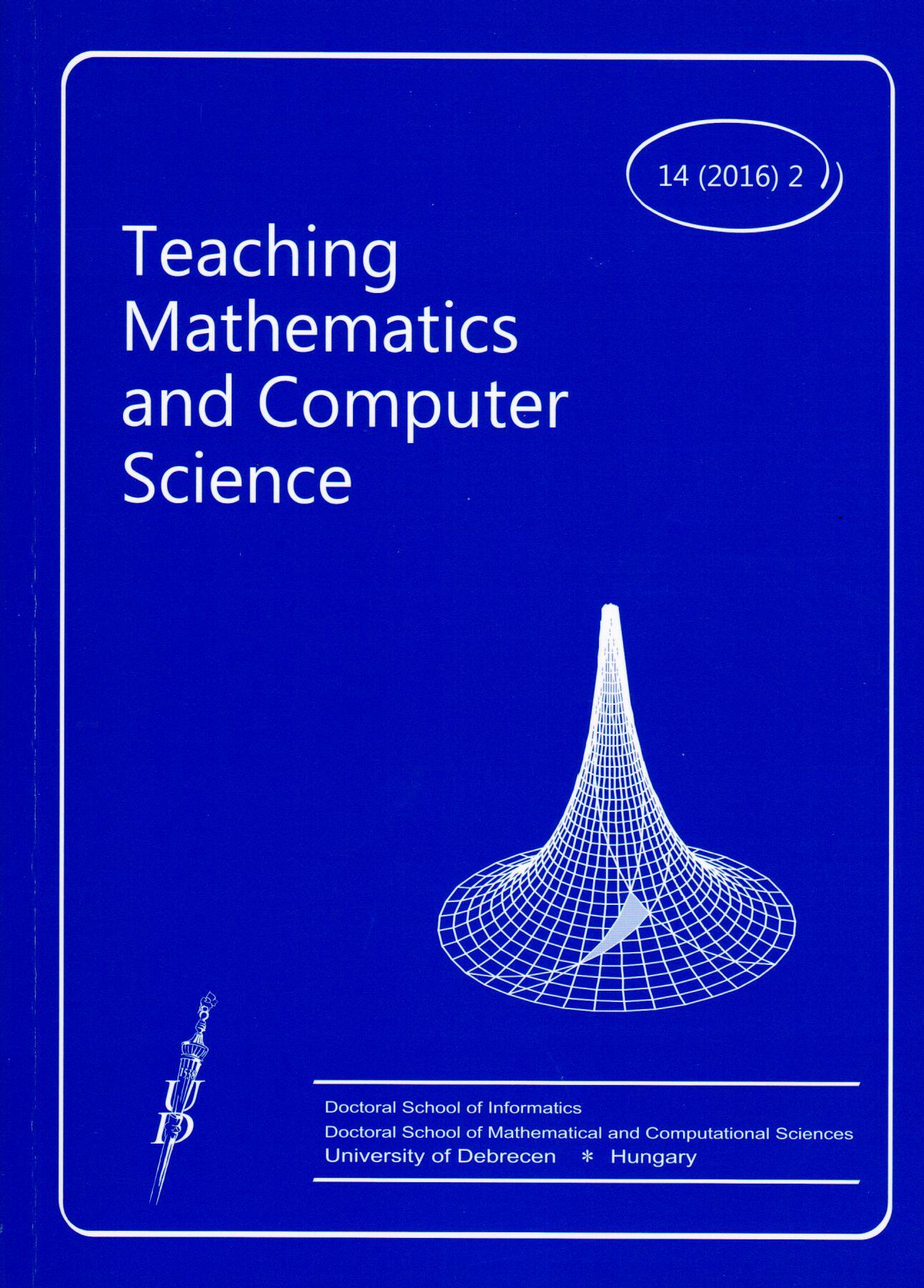Vol. 14 No. 2 (2016)
Published
2016 December 1
##issue.tableOfContents##
Articles
-
Reappraising Learning Technologies from the Viewpoint of the Learning of Mathematics
221-246Views:161Within the context of secondary and tertiary mathematics education, most so-called learning technologies, such as virtual learning environments, bear little relation to the kinds of technologies contemporary learners use in their free time. Thus they appear alien to them and unlikely to stimulate them toward informal learning. By considering learning technologies from the perspective of the learner, through the analysis of case studies and a literature review, this article asserts that the expectation of these media might have been over-romanticised. This leads to the recommendation of five attributes for mathematical learning technologies to be more relevant to contemporary learners' needs: promoting heuristic activities derived from human history; facilitating the shift from instrumentation to instrumentalisation; facilitating learners' construction of conceptual knowledge that promotes procedural knowledge; providing appropriate scaffolding and assessment; and reappraising the curriculum.PDF91 -
Comparing various functions of the divisors of an integer in different residue classes
247-258Views:169The main goal of this paper is to investigate some problems related to the distribution of the divisors of a number in different residue classes. We study these questions modulo 3, and use mostly just elementary number theory. In some special cases, we demonstrate how this problem is related to other fields of maths, especially to combinatorics. Since the author is also a secondary school teacher, we use elementary methods that can be discussed in secondary school, mainly within the framework of group study sessions or in special maths classes. We do think that the investigation of these types of questions can motivate children to find their own way to create their own questions, and to get a deeper insight into problem solving by these experimentations.PDF96 -
Report of Conference XL. National Conference on Teaching Mathematics, Physics and Computer Science August 22-24, 2016 Székesfehérvár, Hungary
259-276Views:135The XL. National Conference on Teaching Mathematics, Physics and Computer Sciences (MAFIOK) was held in Székesfehérvár, Hungary between 22 and 24 August, 2016 at the Alba Regia Technical Faculty of Óbuda University. For the three-day event, more than 80 persons were registered and more than 40 lectures were given. The fortieth anniversary scientific conference was designed for researchers and teachers in mathematics, physics and informatics to promote modern and efficient education in higher education, and through poster presentations and personal meetings to exchange experience. The opening ceremony of the conference followed by the three plenary lectures took place at the ceremonial hall of the Town Hall. ...PDF50 -
Number theory vs. Hungarian highschool textbooks: √2 is irrational
139-152Views:163According to the Hungarian National Curriculum the proof of the irrationality of √2 is considered in grade 10. We analyze the standard proofs from the textbooks and give some mathematical arguments that those reasonings are neither appropriate nor sufficient. We suggest that the proof should involve the fundamental theorem of arithmetic.PDF72 -
The effects of chess education on mathematical problem solving performance
153-168Views:215We investigate the connection between the "queen of sciences" (mathematics) and the "royal game" (chess) with respect to the development of mathematical problem solving ability in primary school education (classes 1-8, age 7-15) where facultative chess education is present. The records of the 2014 year's entrance exam in mathematics – obligatory for the enrollment to secondary grammar schools in Hungary – are compared for the whole national database and for the results of a group containing chess-player students. The problems in the tests are classified with respect to the competencies needed to solve them. For the evaluation of the results we used standard mathematical statistical methods.PDF135 -
Regula falsi in lower secondary school education
169-194Views:176The aim of this paper is to offer some possible ways of solving word problems in lower secondary school education. Many studies have shown that pupils in lower secondary school education (age 13-14) encounter difficulties with learning algebra. Therefore they mainly use arithmetical and numerical checking methods to solve word problems. By numerical checking methods we mean guess-and-check and trial-anderror. We will give a detailed presentation of the false position method. In our opinion this method is useful in the loweer secondary school educational processes, especially to reduce the great number of random trial-and-error problem solving attempts among the primary school pupils. We will also show the results of some problem solving activities among 19 grade 8 pupils at our school. We analysed their problem solving strategies and compared our findings with the results of other research works.PDF137 -
Darstellungen und Vorstellungen und ihre Bedeutung für eine wirksame Metakognition beim Problemlösen und Begründen
195-220Views:151Metacognition has one of the highest effect sizes concerning successful learning. However metacognitive activities during task solving and problem solving are not directly obvious. But they can appear by writing someone's thoughts down. The following analysis, which focusses on the level of argumentation as well as on the way of derivation, shows that the quality of representation is an essential condition for the possibility of metacognition.PDF (German)77
Keywords
Issues by Year
2020
2017
2011
2010
2009
2007
2006
2005
2004
2003







